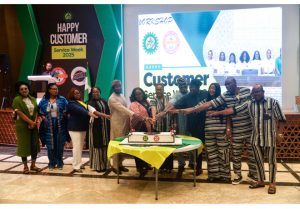 Sixty percent of the participants in the Smart Electrical Engineering Training organised by the Nigerian Content Development and Monitoring Board (NCDMB) have secured employment placements.
Sixty percent of the participants in the Smart Electrical Engineering Training organised by the Nigerian Content Development and Monitoring Board (NCDMB) have secured employment placements.
Four of the 50 engineers secured international placements with BIC Electric and now work in Europe, while other successful participants got employments in Nigeria with AOS Orwell, Daystar Power Group, Eauxwell, Jubaili Bros and PNN amongst others.
The six-month classroom and on the job training was conducted at the Lagos Energy Academy (LEA) by AOS Orwell, an oil and gas servicing company on behalf of the NCDMB. The second batch of 50 engineers would commence their training in September at the same location. The beneficiaries, like all other trainees of NCDMB were selected from the Nigerian Oil and Gas Industry Joint Qualification System (NOGICJQS) and underwent qualifying tests and interviews.
Speaking on Wednesday in Lagos at the certificates presentation ceremony, the Executive Secretary of NCDMB, Engr. Simbi Kesiye Wabote commended AOS Orwell for the success recorded with the Smart Electrical Engineering Training. He described it as a validation of the Board’s new model for human capacity building, which emphasizes the delivery of trainings with a line of sight to employment opportunities.
He stated that the Board had now adopted a 60-20-20 model for human capital development, whereby 60 percent of the training spend and efforts gets devoted to programmes that guarantee jobs for the participants. ”Before we give a training contract to any company, the firm must undertake that 60 percent of the people they would train must secure employments.”
He added that 20 percent of the Board’s trainings would be designed to improve the skills of persons already employed while the remaining 20 percent will cater for general and non-certificated trainings.
According to him, the Board’s new capacity building model would contribute to meeting the targets set in the Nigerian Content 10-year roadmap and achieving the drive of President Muhammadu Buhari’s administration to create employment for young persons from the activities of the oil and gas industry and ancillary sectors.
Wabote regretted that several organizations within and outside the oil and gas industry expend huge resources and train thousands of youths, without defined strategies to get the beneficiaries engaged or employed afterwards.
He challenged other organisations to take a cue from the Board’s training model, adding that ”we are willing to work with other oil and gas service providers with a well thought out training programmes in fulfilment of our mandate.”
He also congratulated the participants, noting that 50 of them graduated without a single drop-out and reports of their performance showed that they passed their tests and now have international certification from Siemens.
He charged the young engineers to utilize any opportunity they get in life and to continue to improve, acquire new knowledge and remain confident.
The Executive Secretary also challenged the incoming participants to surpass the enviable record set by the first batch and to look beyond the collection of stipends to focus more on the acquisition of practical skills under this programme.
He added that “the focus area of this training on smart electrical engineering is also an area very important to the industrialization of our country Nigeria. As the nation moves towards the realization of provision of reliable power supply, it is people like you that will be required to sustain the sector. You should therefore see this training as very relevant as the skills will continually be in high demand.”
The General Manager Lagos Energy Academy (LEA), Mr. Leke Adegbola noted that the 6-month training was conducted in collaboration with Siemens and other international power companies. In addition to the engineering modules, the participants were also trained in values and social responsibility and coached to be in employability state. A total of 960 training hours was recorded in the programme, he said.
The participants made glowing comments about the training, the knowledge and mentoring they received. Some of them recalled that they lacked experience and were unemployed before the programme but have now acquired highly specialized skills and begun careers in electrical engineering with reputable companies.
They also thanked NCDMB and the LEA for the lifetime opportunity and promised to remain good ambassadors of the programme.
Discover more from Nigerian Content Development & Monitoring Board
Subscribe to get the latest posts sent to your email.










